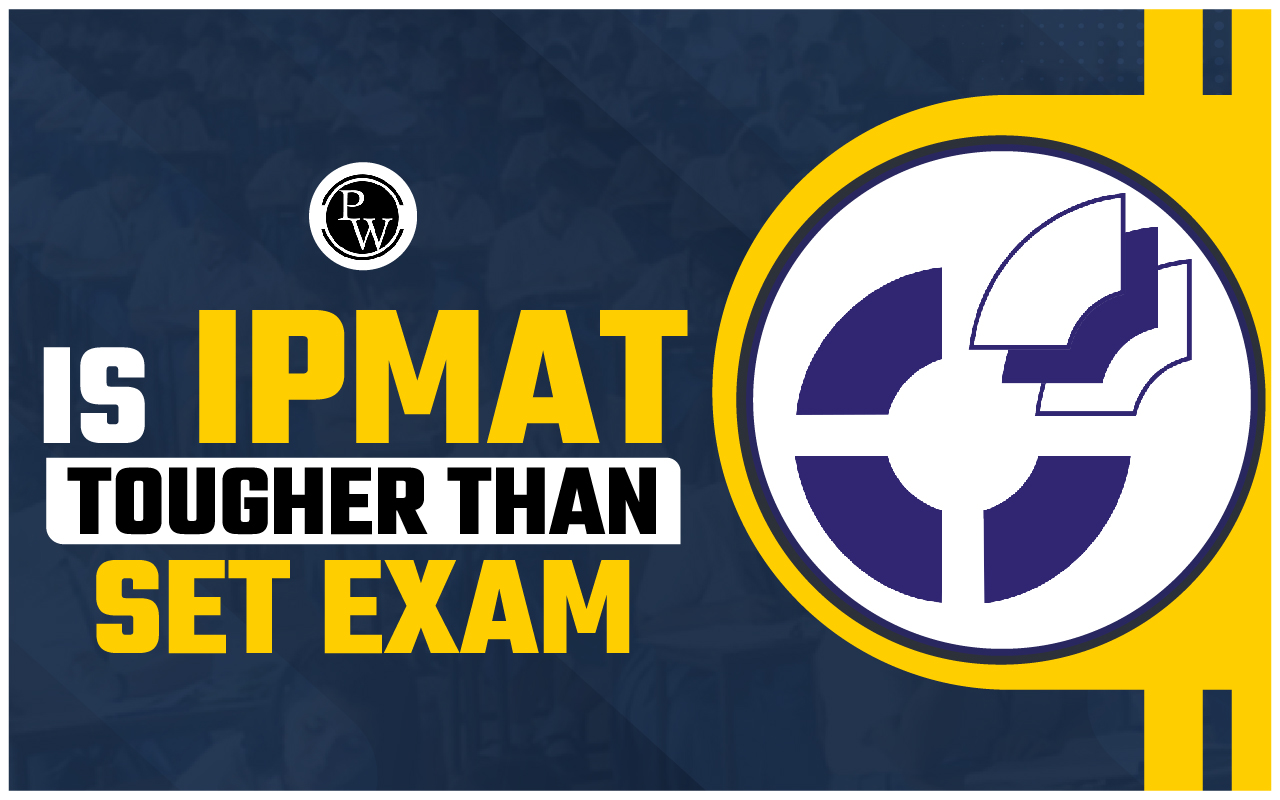
Toppers Tips to Crack IPMAT: Cracking the IPMAT exam is an important step for students aspiring to join the prestigious IIMs. Success in IPMAT requires smart preparation, strong fundamentals, and disciplined practice. The exam consists of three sections, i.e., Quantitative Ability, Logical Reasoning, and Verbal Ability, each testing different skills.
To crack IPMAT, focus on building conceptual clarity, practicing regularly with mock tests, and improving time management. Analyzing mistakes, staying updated with current affairs, and seeking guidance when needed are equally important. With the right IPMAT preparation strategy, consistency, and a positive mindset, you can achieve your goal of securing admission through the IPMAT exam. Following Toppers Tips to Crack IPMAT EXAM will give you a clear edge.
IPMAT Exam Pattern and Syllabus:
Before you begin preparing for IPMAT, it's crucial to understand the IPMAT exam pattern and syllabus . The exam consists of three sections: Quantitative Ability (QA), Logical Reasoning (LR), and Verbal Ability (VA). Each section is allotted 40 minutes, and the total duration of the exam is two hours.
-
QA tests algebra, geometry, trigonometry, and arithmetic.
-
LR covers puzzles, seating arrangement, and data interpretation.
-
VA focuses on grammar, vocabulary, and comprehension.
The weightage of sections may change every year, so always stay updated with the latest pattern. A smart way is to go through Toppers Tips to Crack IPMAT EXAM, which emphasize knowing the syllabus thoroughly before planning.
Top tips and strategy Takeways to Crack IPMAT:
Preparing for IPMAT can feel overwhelming, but the right approach makes it easier. Toppers suggest focusing on smart strategies rather than just hard work. Below are the Toppers Tips to Crack IPMAT EXAM that will guide you step by step.
- Develop a comprehensive study plan that covers all the topics and allows for ample revision time.
- Build a strong foundation in the basic concepts of mathematics, logical reasoning, and verbal ability.
- Practice regularly with previous year question papers, sample papers, and mock tests to improve speed and accuracy.
- Learn to allocate time to each section and question wisely during the exam.
- Stay updated with the latest current affairs topics and seek guidance to clarify doubts .
- Maintain a positive attitude and believe in your capabilities to stay motivated throughout your exam journey.
IPMAT Exam Pattern
Before preparing, know the exam structure. IPMAT has three sections i.e., Quantitative Ability, Logical Reasoning, and Verbal Ability. Understanding the pattern helps you plan better and manage time effectively. The table below contains IPMAT Exam pattern:
| Section | No. of Questions | Marks | Negative Marking |
| Quantitative Ability | 20 | 80 | 0.25 |
| Logical Reasoning | 16 | 64 | 0.25 |
| Verbal Ability | 24 | 96 | 0.25 |
IPMAT Syllabus
Before starting your IPMAT preparation, it’s essential to know the detailed syllabus. A clear understanding of the topics helps you create a focused study plan, manage time effectively, and strengthen areas that need more practice.
- Quantitative Ability: Algebra, Geometry, Trigonometry, Probability, Permutation and Combination, Arithmetic, Mensuration
- Logical Reasoning: Puzzles, Seating Arrangement, Venn Diagrams, Data Interpretation, Blood Relations, Syllogism
- Verbal Ability: Grammar, Vocabulary, Reading Comprehension, Para Jumbles, Synonyms and Antonyms, Fill in the Blanks, Sentence Correction
Create a Study Plan
Developing a study plan is crucial to your success in the IPMAT exam. A well-structured and organized study plan will help you cover all the exam topics and ensure you have ample revision time. Here are some essential tips to create an effective study plan:- Divide your syllabus into smaller segments - Break down your syllabus into smaller segments, and assign specific time frames for each segment. This will help you focus on one topic at a time and prevent you from feeling overwhelmed.
- Set realistic goals - While setting goals, be realistic and keep in mind your strengths and weaknesses. Don't overburden yourself with unrealistic goals that you cannot achieve.
- Include time for revision - Revision is crucial to consolidating what you have learned and retaining it. Plan your revision time accordingly.
- Allocate sufficient time for practice - Practice is key to cracking the IPMAT exam. Allocate sufficient time for practice sessions, which will help you get familiar with the exam format and improve your speed and accuracy.
Focus on Strong Foundation
To crack IPMAT, it is essential to build a strong foundation in the basic concepts of mathematics, logical reasoning, and verbal ability. Rather than just cramming formulas and shortcuts, it is important to develop conceptual clarity and problem-solving skills. Start by revising the fundamental concepts of each subject. Practice simple problems and gradually move on to more complex ones. Seek help from teachers and mentors when needed. Use online resources and reference books to gain a deeper understanding of the concepts. Try solving questions from different difficulty levels to get a better grip on the subject. This will help you tackle the exam with confidence and ease. Consistent practice will help you identify your strengths and weaknesses, enabling you to focus your efforts accordingly. Remember, a strong foundation is the key to crack IPMAT and excel in your future endeavors.Practice Regularly
Practice is a crucial aspect of cracking the IPMAT exam. Regular practice will help you become familiar with the exam format and improve your speed and accuracy in solving questions. Here are some tips for practicing regularly:- Create a study schedule: Plan a schedule that includes regular practice sessions. Allocate time to solving previous year question papers, sample papers, and mock tests.
- Start with basic concepts: Begin with the basic concepts of mathematics, logical reasoning, and verbal ability. Then, gradually move on to solving questions of varying difficulty levels.
- Improve your speed and accuracy: Set a time limit for solving each question and try to solve it within that limit. This will help you improve your speed and accuracy and prepare you for the actual exam.
- Track your progress: Keep track of your progress by regularly solving practice papers and mock tests. Analyze your performance and identify areas where you need improvement.
Time Management:
Effective time management is crucial for success in IPMAT. The exam is time-bound, and you must ensure that you utilize your time efficiently to attempt all the questions. Develop a strategy to allocate time to each section and stick to it during the exam. Practice solving questions within the given time limits to enhance your speed and efficiency. Use a timer or stopwatch to measure the time taken to answer each question and refine your approach accordingly. Additionally, make sure to allocate time for revising your answers before submitting the paper.Analyze and Learn from Mistakes
One of the most important aspects of preparing for IPMAT is to regularly analyze your mistakes. This will help you identify your weaknesses and work towards improving them. It is important to learn from your mistakes, as this will help you avoid similar errors in the actual exam. When analyzing your mistakes, keep track of the types of questions you are struggling with. Are they from a particular section? Do they require a specific strategy or approach? Understanding the root cause of your mistakes will help you address them more effectively. "Mistakes are not failures, they are opportunities to learn." Additionally, make sure to revisit the questions you get wrong and understand the correct approach to solving them. This will help you build your problem-solving skills and enhance your understanding of the concepts. Finally, don't be too hard on yourself. Everyone makes mistakes, especially while preparing for an exam as challenging as IPMAT. Instead, use your mistakes as learning opportunities and keep pushing yourself towards improvement.Stay Updated with Current Affairs
Along with maths, reasoning, and verbal ability, staying updated with current affairs is equally important for IPMAT. Good knowledge of current events improves your general awareness and can help in the exam.
Read newspapers, magazines, or trusted online sources daily. Try to read at least one article every day. It will keep you updated and make it easier to remember facts. You can also join study groups or online forums to discuss current affairs with other aspirants.
Since current affairs play a key role in the exam, be sure to give them proper time in your study plan. Staying informed will increase your confidence and help you score better.
Seek Guidance and Clarify Doubts
Don't be afraid to seek guidance during your IPMAT preparation journey. If you have any doubts or difficulties, reach out to your teachers, mentors, or fellow students for help. Clarifying your doubts will help you have a better understanding of the concepts and be better prepared for the exam. It's essential to have a support system that can guide you through challenging topics and help you stay motivated .Stay Motivated and Stay Positive
Staying motivated and positive is critical to achieving success in IPMAT 2023 . Here are some tips to help you stay focused and energized throughout your exam preparation:- Set small goals: Break your study plan into smaller, achievable goals. Celebrate each milestone you reach to stay motivated .
- Rewards system: Plan a reward system for yourself after completing each goal. It could be anything from treating yourself to your favorite food or taking a break to watch an episode of your favorite TV series.
- Surround yourself with positivity: Stay connected with people who uplift you and encourage you to do better. Limit interactions with negative influences that may demotivate you.
- Practice gratitude: Consider writing down three things you are thankful for each day. This will help you maintain a positive attitude.
- Visualize success: Imagine yourself successfully cracking IPMAT. Visualize the feeling of accomplishment and let it motivate you.









